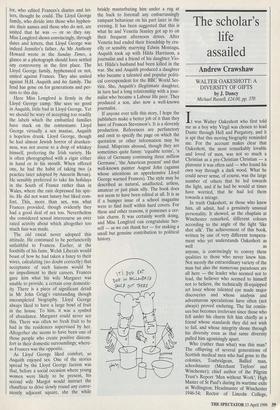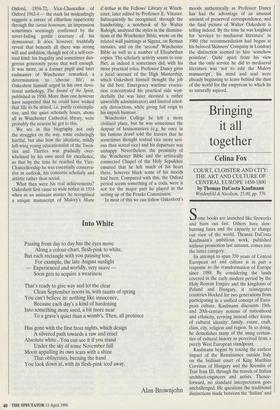The scholar's life assailed
Andrew Crawshaw
WALTER OAKESHOTT: A DIVERSITY OF GIFTS by J. Dancy Michael Russell, £24.00, pp. 370 It was Walter Oakeshott who first told me as a boy why Virgil was chosen to lead Dante through Hell and Purgatory, and it is apt that this moving biography reminded me. For the account makes clear that Oakeshott, the most remarkably lovable and loved of men, was not so much a Christian as a pre-Christian Christian — a platonist it was often said — who found his own way through a dark wood. What he could never sense, of course, was the large number of others that he led towards the light, and if he had he would at times have worried, that he had led them towards a mirage.
In truth Oakeshott, as those who knew him, all admit, had a genuinely unusual personality. It showed, as the chaplain at Winchester remarked, different colours according to the angle of the light 'like shot silk'. The achievement of this book, written by one of very different tempera- ment who yet understands Oakeshott as well as anyone, is convincingly to convey these qualities to those who never knew him. Not merely the extraordinary variety of the man but also the numerous paradoxes are all here — the leader who seemed not to lead, the believer who seemed to himself not to believe, the technically ill-equipped art lover whose talented eye made major discoveries and whose analysis and adventurous speculations have often (not always) proved enduring. The list contin- ues but becomes irrelevant since those who fell under his charm felt him chiefly as a friend whose standards they did not wish to fail, and whose integrity shone through his diversity even as that same diversity pulled him agonisingly apart. Who (rather than what) was this man? The offspring of several generations of Scottish medical men who had gone to the colonies, Tonbridgean, Balliol man, schoolmaster (Merchant Taylors' and Winchester); chief author of the Pilgrim Trust's Report 'Men without Work'; High Master of St Paul's during its wartime exile at Wellington; Headmaster of Winchester 1946-54; Rector of Lincoln College, Oxford, 1954-72; Vice-Chancellor of Oxford 1962-4 — the stark list misleadingly suggests a career of effortless superiority through the cursus honorum, an impression sometimes seemingly confirmed by the never-failing gentle courtesy of his demeanour. It does, however, truthfully reveal that beneath all there was strong will and ambition, though not of a self-cen- tred kind: his frugality and sometimes dan- gerous generosity prove that well enough. It was more, as a former pupil and later eadmaster of Winchester remarked, a determination to 'choose life', as Oakeshott himself urged in his own devo- tional anthology, The Sword of the Spirit, published in 1950. More than one however have suspected that he could have wished that life to be mixed, i.e. partly contempla- tive, and the quiet scholarly hours, above all in Winchester Cathedral library, were probably the nearest he got to this.
We see in this biography not only the struggles on the way, some enduringly hurtful, but also how the idealistic, mildly left-wing young educationalist of the Twen- ties and Thirties was gradually over- whelmed by his own need for excellence, so that by the time he reached the Vice- Chancellorship he was essentially conserva- tive in outlook, his concerns scholarly and artistic rather than social.
What then were his real achievements? Oakeshott first came to wide notice in 1934 when as an assistant master he recognised a unique manuscript of Malory's Morte d'Arthur in the Fellows' Library at Winch- ester, later edited by Professor E. Vinaver. Subsequently he recognised, through the handwriting, a notebook of Sir Walter Raleigh, analysed the styles in the illumina- tions of the Winchester Bible, wrote on the related wall paintings at Sigena, on Roman mosaics, and on the 'second' Winchester Bible as well as a number of Elizabethan copies. The scholarly activity seems to con- flict, as indeed it sometimes did, with his more practical roles. Professor Dancy gives a lucid account of the High Mastership, which Oakeshott himself thought the job he did best. Emergency wartime evacua- tion concentrated his practical side won- derfully (he was later deemed a rather unworldly administrator) and limited schol- arly distractions, while giving full reign to his impish humour.
Winchester College he left a more civilised place, but he was sometimes the despair of housemasters (e.g. he once in his famous drawl told the leavers that he sometimes thought textual vice more seri- ous than sexual vice) and his departure was unhappy. Nevertheless, the proximity of the Winchester Bible and the artistically connected Chapel of the Holy Sepulchre ensured that he left much of his heart there, however black some of his moods had been. Compared with this, the Oxford period seems something of a coda, were it not for the major part he played in the setting up of the Franks Commission.
In most of this we can follow Oakeshott's moods authentically as Professor Dancy has had the advantage of an unusual amount of preserved correspondence, and the final picture of Walter Oakeshott is telling indeed. By the time he was knighted for 'services to mediaeval literature' in 1980 (the recommendation had begun at his beloved Skinners' Company in London) the distinction seemed to him 'somehow pointless'. Quite apart from his view that the only service he did to mediaeval literature was 'not to edit the Malory manuscript', his mind and soul were already beginning to leave behind the dust of the world for the empyrean to which he so naturally aspired.



































































 Previous page
Previous page